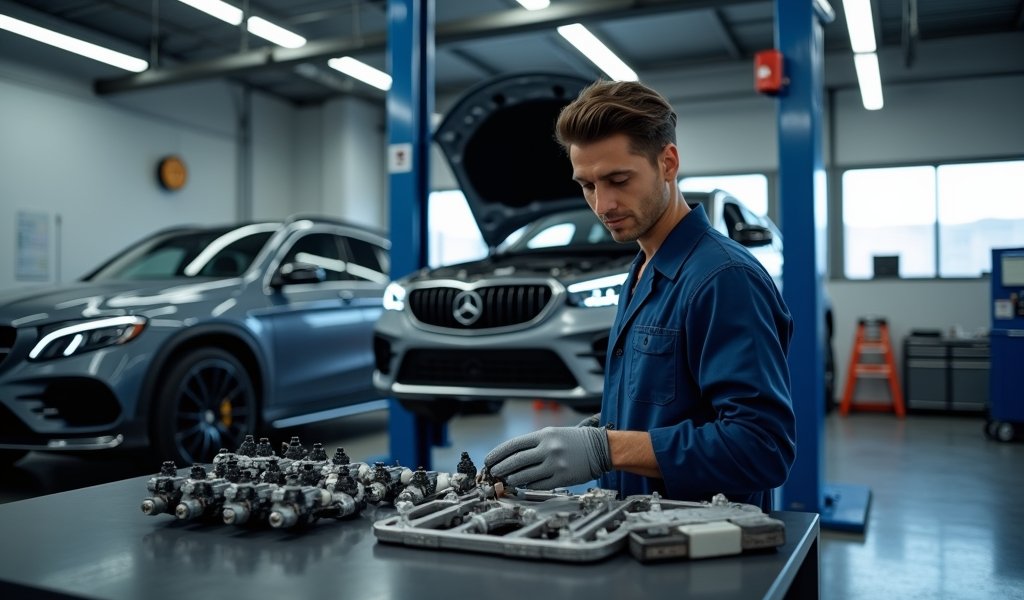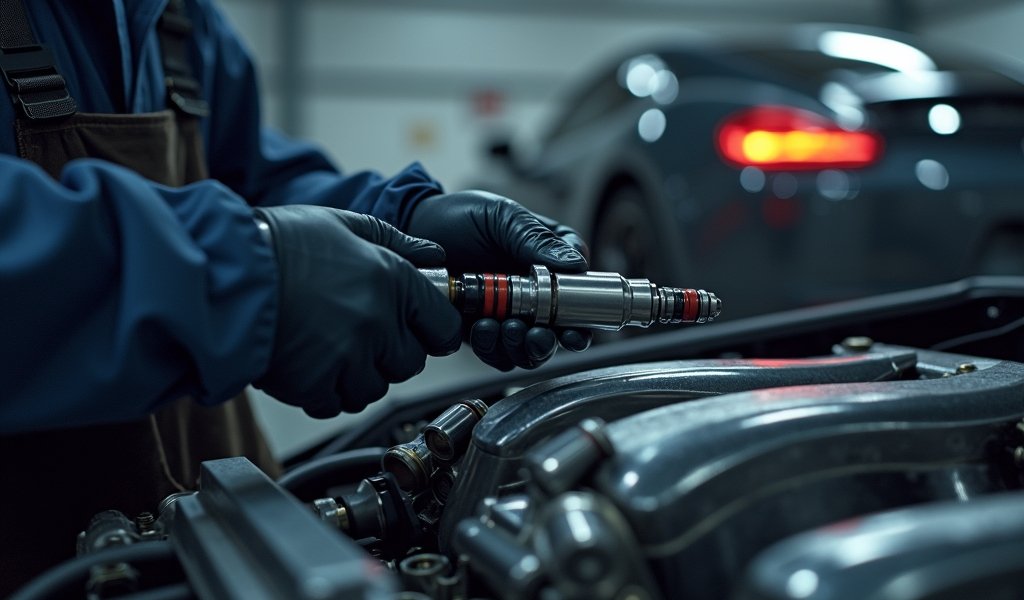Overview
This article explains how fuel injector cleaning is essential for maintaining engine performance, detailing signs of dirty injectors (engine misfires, poor fuel economy, rough idling, check engine light, and hesitation), DIY cleaning methods, professional ultrasonic cleaning options, and preventative maintenance strategies. Regular injector maintenance is cost-effective, saving $210-630 annually in fuel costs while preventing expensive engine damage and extending vehicle lifespan.
Table of Contents
- Understanding Fuel Injectors: The Gateway to Engine Performance
- 5 Telltale Signs Your Fuel Injectors Need Cleaning
- DIY Fuel Injector Cleaning Methods That Actually Work
- Professional Ultrasonic Cleaning: When DIY Won’t Cut It
- Preventative Maintenance: Keeping Injectors Happy
- The Cost-Benefit Analysis of Regular Injector Cleaning
- Conclusion
- Frequently Asked Questions
Understanding Fuel Injectors: The Gateway to Engine Performance
The fuel injector cleaning procedure might sound like just another car maintenance chore, but let me tell you—it’s more like giving your engine a spa day! Think of fuel injectors as the tiny baristas of your engine, precisely squirting the perfect amount of fuel into the combustion chamber. When they’re clean, your engine purrs like a contented cat. When they’re clogged? Well, that’s when your vehicle starts throwing a mechanical temper tantrum.
I’ve been elbow-deep in engines for over 15 years, and I can spot a dirty injector from the way a car pulls into my shop. Your injectors are the unsung heroes that transform liquid fuel into a fine mist that ignites efficiently. This atomization process is crucial—it’s the difference between your engine drinking smoothly through a straw versus trying to slurp through one clogged with yesterday’s milkshake.
Modern engines particularly demand pristine injectors. With stricter emissions standards and the push for better fuel economy, these precision instruments have to perform their dance with microscopic accuracy. Even tiny deposits can disrupt the spray pattern and throw off the air-fuel ratio that proper car servicing works so hard to maintain.
Now, let’s dive into how to keep these critical components in tip-top shape, ensuring your car’s heart beats strong for miles to come.
5 Telltale Signs Your Fuel Injectors Need Cleaning
Your car communicates with you more than you might realize. When fuel injectors start getting gunked up, your vehicle sends out distress signals that scream, “Help! My injectors are choking on crud!” Here are the five red flags that shouldn’t be ignored:
1. Engine Misfires That Make You Jump
When your morning commute feels more like a rodeo ride, with the engine bucking and jerking, dirty injectors might be the culprits. These misfires occur because the fuel spray pattern has become irregular, creating pockets of lean or rich fuel mixture that ignite unpredictably. It’s like trying to light a campfire with wet wood—sometimes it catches, sometimes it sputters.
2. Fuel Economy That Makes Your Wallet Cry
Noticed you’re visiting the gas station more frequently than your mother-in-law? Clogged injectors can slash your fuel economy by up to 30%. According to fuel system experts, that’s like throwing a $20 bill out your window every 100 miles. Your injectors are essentially overserving the engine, and you’re picking up the tab.
3. Rough Idling That Sounds Like a Washing Machine
If your car sounds like it’s washing a load of bricks when idling at a stoplight, take note. A healthy engine should purr, not rattle. Dirty injectors create an uneven fuel distribution that makes your engine rumble and vibrate like it’s auditioning for a heavy metal band. This isn’t just annoying—it’s a clear signal that your fuel system is crying out for attention.
4. The Check Engine Light’s Unwelcome Glow
Ah, the dreaded check engine light—the automotive equivalent of your body running a fever. Modern engines are monitored by sophisticated computers that detect when fuel injectors aren’t performing optimally. When they sense problems like lean running conditions or misfires, they illuminate that amber warning light faster than you can say “not another repair bill.”
5. Hesitation That Leaves You Vulnerable at Intersections
There’s nothing quite like the panic of pressing the gas pedal and experiencing… nothing. Then suddenly—ZOOM—your car lunges forward. This hesitation happens because dirty injectors can’t deliver the prompt fuel spray needed for smooth acceleration. In traffic, this delay isn’t just frustrating; it can be downright dangerous when you’re trying to merge onto a highway or cross a busy intersection.

DIY Fuel Injector Cleaning Methods That Actually Work
Roll up those sleeves, weekend warriors! While some car maintenance requires a professional’s touch, there are effective DIY approaches to keeping those injectors flowing freely. As someone who’s both fixed cars professionally and taught countless car owners to handle maintenance themselves, I can tell you these methods actually deliver results.
Fuel Additives: Your First Line of Defense
The simplest way to clean injectors is pouring a quality fuel system cleaner into your tank before filling up. These cleaners contain detergents that dissolve carbon deposits as they flow through your fuel system. Think of them as sending tiny scrubbing bubbles through your injectors!
For best results, choose products containing polyisobutylamine or polyisobutylene amine (PIBA), which are industrial-strength cleaners that blast away deposits without damaging sensitive components. Consumer Reports testing shows significant differences between brands, so don’t just grab the cheapest option on the shelf.
I recommend using a good cleaner every 3,000 miles, or at least quarterly. Pour it into a nearly empty tank, then fill up with gas to ensure proper mixing. This simple step can be incorporated into your DIY car maintenance routine and prevent major injector issues down the road.
Pressure Canister Cleaning: The Step-Up Method
Ready for something more involved? Pressure canister cleaning uses a specialized tool that connects to your fuel rail and forces cleaning solution directly through your injectors at high pressure. It’s like giving your injectors a power wash instead of a gentle rinse.
This method requires some mechanical knowledge and a fuel injector cleaning kit (available at auto parts stores for $50-100). You’ll disconnect your fuel pump, connect the canister to the fuel rail, and let the cleaning solution circulate while the engine runs. The process typically takes about 30 minutes and can restore injectors to near-original performance.
Fair warning: this isn’t for the faint of heart. You’ll be working with fuel systems, so safety precautions are essential. Always follow the kit instructions meticulously, wear eye protection, and have a fire extinguisher nearby. If you’re not comfortable working around fuel systems, this might be where you tag in a professional.
Throttle Body Cleaning: The Often Forgotten Companion Procedure
While not directly part of the injectors, the throttle body works in concert with them and deserves attention during your cleaning marathon. This component controls airflow into your engine and can get gunked up with the same deposits that plague injectors.
Cleaning it is straightforward: disconnect the air intake hose, spray throttle body cleaner on the exposed parts (with the engine off!), and gently scrub with a soft brush. This five-minute procedure complements your injector cleaning efforts and helps maintain that perfect air-fuel mixture your engine craves.
Remember, though, that DIY methods have their limits. For severely clogged injectors or persistent problems, you’ll need to consider the heavy artillery: professional ultrasonic cleaning.
Professional Ultrasonic Cleaning: When DIY Won’t Cut It
Sometimes, DIY approaches hit their limit—like trying to perform surgery with a butter knife. When fuel additives and pressure cleaning don’t restore your injectors to their glory days, it’s time to call in the cavalry: professional ultrasonic cleaning.
Ultrasonic cleaning isn’t just a fancy name to justify a higher price tag—it’s cutting-edge technology that works wonders on stubborn injector deposits. This process utilizes high-frequency sound waves (typically 40-90 kHz) that create microscopic bubbles in a cleaning solution. When these bubbles implode, they generate intense pressure and temperature at a micro-level, literally blasting deposits off injector surfaces without damaging the delicate components.
Let me walk you through what happens when you take your injectors for this spa treatment:
First, a trained technician removes your fuel injectors from the engine—already a precise job requiring specialized tools and expertise. Each injector is then carefully disassembled to expose all the internal components that rarely see the light of day. The technician inspects these parts under magnification, checking for wear, damage, or particularly stubborn deposits.
Next comes the ultrasonic bath. The injectors are submerged in a specialized cleaning solution inside an ultrasonic tank. This isn’t your grandmother’s jewelry cleaner—these are industrial-grade machines costing thousands of dollars, calibrated specifically for automotive components. The ultrasonic waves penetrate microscopic crevices no liquid alone could reach, dissolving carbon, varnish, and other contaminants that have been baked onto the metal over thousands of miles.
After the ultrasonic treatment, technicians perform a series of tests using equipment that would make NASA engineers nod in approval. Each injector is connected to a specialized machine that measures spray pattern, droplet size, flow rate, and leak-down—all critical factors in injector performance that DIY methods simply cannot address. Injectors that don’t meet factory specifications are adjusted, repaired, or replaced.
The cost typically ranges from $30-50 per injector plus labor for removal and installation, putting a complete service between $200-500 depending on your vehicle. That might seem steep compared to a $10 bottle of fuel system cleaner, but when you consider the precision testing and guaranteed results, it’s actually quite reasonable for the value delivered.
This service is particularly beneficial for high-mileage vehicles, performance cars, or if you’ve experienced persistent driveability issues that DIY cleaning couldn’t fix. Think of it as the difference between washing your face with water versus getting a professional deep-cleansing facial—both clean your face, but one reaches a level the other simply cannot.
Remember, ultrasonic cleaning is not a DIY job. The specialized equipment costs tens of thousands of dollars, requires professional training to operate correctly, and the process of safely removing and reinstalling injectors demands experience with your specific engine type. This is one area where trusting professionals truly pays dividends.
Preventative Maintenance: Keeping Injectors Happy
An ounce of prevention is worth a pound of cure—especially when that “pound of cure” means having your car in the shop for days! Keeping fuel injectors clean is infinitely easier than restoring heavily clogged ones. Let’s explore how to prevent injector issues before they start, saving you time, money, and the special kind of headache that only car troubles can induce.
Fuel Quality Matters More Than You Think
Not all gas is created equal, my friends. That suspiciously cheap fuel from the no-name station might save you a few bucks today, but it could cost you hundreds in injector repairs tomorrow. Top-tier gasoline contains more detergents and cleaning agents that help prevent deposit formation. Major brands like Shell, Chevron, and Exxon invest heavily in additive packages that keep your fuel system clean with every tank.
In fact, research by the American Automobile Association found that non-top-tier fuels can leave up to 19 times more deposits in your engine after just 4,000 miles of driving. That’s like choosing between a shower with soap or just standing in water—both get you wet, but only one actually cleans you!
Change Your Fuel Filter Before It’s Too Late
Your fuel filter is the unsung hero protecting your injectors from particulates and contaminants. When it gets clogged, it either restricts fuel flow or, worse, allows debris to bypass and head straight for your precious injectors.
Most manufacturers recommend changing the fuel filter every 30,000 miles, but if you frequently drive in dusty conditions or use lower-quality fuel, consider doing it every 15,000-20,000 miles instead. It’s a small investment that pays huge dividends in injector longevity.
Don’t Let Your Tank Run on Fumes
We’ve all been there—stretching that last gallon of gas until the needle is firmly below “E.” Besides the obvious risk of getting stranded, this habit is terrible for your injectors. The dregs at the bottom of your tank contain more contaminants and sediment that can clog injector screens and precision nozzles.
Try to keep your tank at least a quarter full at all times. Think of it as maintaining a healthy minimum balance in your bank account—it’s just good practice that prevents problems.
Regular Fuel System Cleaners as Preventative Medicine
Remember those fuel additives we discussed earlier? Using them preventatively before problems develop is even smarter than using them as a cure. Consider adding a quality injector cleaner to your tank every 3,000 miles or every third fill-up.
This regular maintenance costs just a few dollars per treatment but can extend the life of your injectors by years. It’s like flossing your teeth—a small, regular effort prevents expensive, painful procedures later.

The Cost-Benefit Analysis of Regular Injector Cleaning
Let’s talk money—because at the end of the day, we all want to know if maintaining those fuel injectors is worth opening our wallets for. Spoiler alert: it absolutely is, and I’m about to show you why with some real numbers that might surprise you.
First, consider the cost of neglect. Severely clogged injectors can reduce fuel economy by 10-30%. For the average driver covering 15,000 miles annually in a vehicle that normally gets 25 MPG, that’s an extra 60-180 gallons of fuel per year. At $3.50 per gallon, you’re looking at $210-630 in wasted fuel annually—enough to make any budget-conscious person wince!
Then there’s the performance angle. Dirty injectors reduce power output, meaning your 0-60 time might increase from the factory spec of 7.5 seconds to a sluggish 8.5 seconds or worse. While this might not matter during your grocery run, it can affect safety when merging onto highways or passing on two-lane roads.
Let’s break down the fuel injector cleaning costs for different approaches:
DIY Fuel Additives: $8-15 every 3,000 miles = approximately $40-75 per year
Professional Pressure Cleaning: $100-150 annually
Ultrasonic Cleaning: $200-500 every 50,000-60,000 miles = $40-100 per year when amortized
Compare these costs to the potential $210-630 in annual fuel savings alone, and the math becomes clear—regular maintenance pays for itself, often many times over. Plus, clean injectors mean fewer check engine lights, failed emissions tests, and frustrating driveability issues that might leave you stranded or late for important appointments.
There’s also the hidden cost of accelerated wear on other engine components. When injectors spray irregular patterns, they create hot spots in your combustion chambers that can damage pistons, valves, and cylinder walls—leading to repairs that can easily run into the thousands.
For the truly numbers-oriented, consider this: proper injector maintenance typically costs 0.5-1.5 cents per mile driven. Compare that to the 2-5 cents per mile in potential fuel waste from dirty injectors, plus the amortized cost of premature engine wear, and the decision becomes a no-brainer.
The verdict? Regular fuel injector cleaning isn’t just an expense—it’s an investment with measurable returns. Your wallet, your engine, and future you will all thank you for making this small but significant commitment to your vehicle’s health.
Conclusion
Fuel injectors might be tiny compared to other engine components, but their impact on your vehicle’s performance, efficiency, and longevity is nothing short of monumental. By now, you understand that these precision instruments deserve regular attention—not just when problems arise.
Whether you choose the DIY route with quality fuel additives, opt for professional pressure cleaning, or go all-out with ultrasonic treatment for severely clogged injectors, the important thing is that you’re taking action. Each mile you drive with clean injectors is a mile with optimal fuel economy, reduced emissions, and an engine that purrs rather than protests.
Remember that prevention always trumps cure. Using quality fuel, changing filters on schedule, keeping your tank reasonably full, and using periodic cleaning agents are simple habits that pay significant dividends over your vehicle’s lifetime.
The next time your car hesitates when accelerating or your check engine light mysteriously illuminates, you’ll have the knowledge to consider whether your fuel injectors are sending an SOS signal. And more importantly, you’ll know exactly what to do about it.
Your engine’s health is ultimately in your hands. By making fuel injector maintenance part of your regular vehicle care routine, you’re not just saving money—you’re extending your car’s life and ensuring that every drive is as smooth, efficient, and enjoyable as the engineers intended.
Frequently Asked Questions
How often should I clean my fuel injectors?
For preventative maintenance, add a quality fuel system cleaner every 3,000 miles or every third oil change. Consider professional cleaning every 30,000-50,000 miles depending on your driving conditions and fuel quality.
Can dirty fuel injectors damage my engine?
Absolutely! Clogged injectors create irregular spray patterns that cause uneven combustion, leading to hot spots that can damage pistons, valves, and cylinder walls. This accelerated wear can lead to expensive repairs if left unchecked.
Will fuel injector cleaning improve my gas mileage?
Yes, cleaning clogged injectors can improve fuel economy by 10-30% in severe cases. Even moderately dirty injectors can reduce efficiency by 5-10%, so regular cleaning directly benefits your wallet at the pump.
Is ultrasonic cleaning worth the extra cost?
For high-mileage vehicles or those with persistent performance issues despite using fuel additives, ultrasonic cleaning is absolutely worth it. The precision testing and thoroughness of professional cleaning restore injectors to near-factory specifications that DIY methods cannot match.
Can I clean fuel injectors without removing them?
Yes, both fuel additives and pressure canister cleaning methods work without removing injectors. However, these methods cannot remove severe deposits or test/adjust spray patterns like professional ultrasonic cleaning that requires injector removal.

